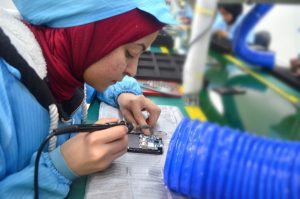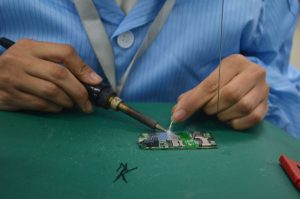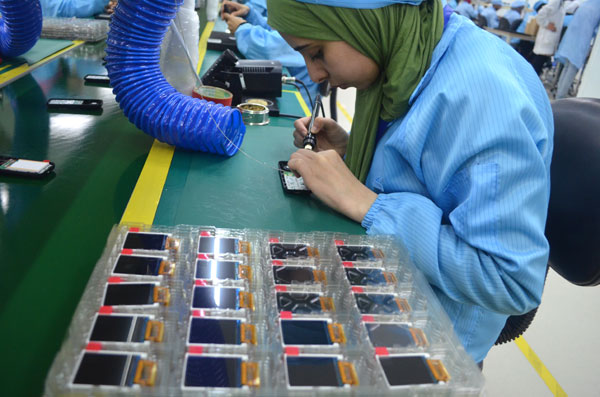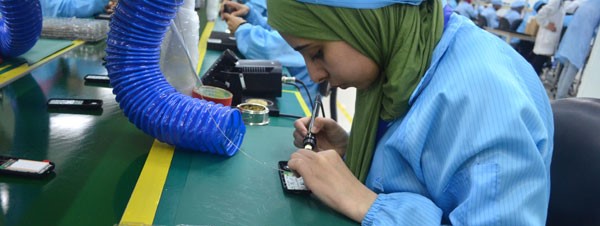It takes Nada Gamal, 20, an hour each day to reach her job at E-SICO mobile factory from her home in Mousha, a small town not far from Assiut. For Gamal, the relatively long commute is a minor price to pay. “There are very few factories in all of Upper Egypt, so much so that no one believes me when I say I work in a mobile factory,” she says. “Even I questioned if there really was a factory in Assiut when my friends told me about it.

”Egypt’s first mobile factory and the SICO brand it produces are owned by SICO Electronics (E-SICO), 80 percent of which is held by SICO Technologies and the remaining 20 percent by state-owned Silicon Waha.
Gamal, who is a graduate of an electronics technical school, is one of 240 young women employed by E-SICO. Company Chairman Mohamed Salem attributes the heavy reliance on women to the nature of mobile manufacturing. “Constructing a mobile is very delicate work, it requires small hands,” he explains. “Throughout Asia, most mobile factories employ only women in production mainly for this reason.”
While SICO mobiles have been manufactured locally for just over a year, SICO has been producing devices in China since 2014, according to Safwat Haroun, vice president of the E-SICO factory. SICO’s mobiles have been distributed in Egypt and the Gulf, however, “on a smaller scale as the brand only received nationwide recognition when it moved its operations to Egypt,” he notes.
Today a large chunk of sales are in the governorates of Assiut, Sohag, Red Sea, Kafr el Sheikh, and Sharqia. The company also distributes in Cairo and Alexandria, says Salem adding that E-SICO exports about 10 percent of its production to Oman, Kuwait, and the U.A.E, with plans to begin exporting to Nigeria and Morocco.
Salem attributes the decision to move operations to Egypt to several factors, chief among them is cost. “Labor, transportation, electricity, general business needs, even acquiring a consultant, these are all cheaper in Egypt and at the same quality level,” he says. However, he notes, other factors such as supply chain and the general ecosystem that the Chinese market enjoys a better standing in.
Furthermore, all of Egypt’s six technology parks have investment incentives. However, the new investment law allows the two parks in Upper Egypt—Beni Suef and Assiut—to offer a tax deduction equal to 50 percent of the value of invested capital, compared to 30 percent for the others.
Besides these incentives, says Salem, a huge factor in choosing Assiut’s technology park was the presence of a committed workforce. “Due to the calm nature and limited outing options of Upper Egypt,” he explains, “employees here tend to have higher discipline in comparison to Cairo, for example.”
Expanding on the factory’s success, Hossam Osman, adviser for innovation and training at the Ministry of Communications and Information Technology, says the government is currently in contact with five global technology players—not all of which are present the Egyptian market—about expanding technology-related hardware manufacturing in Upper Egypt.
“One of the projects we are keen on implementing is manufacturing tablets in Upper Egypt,” says Osman. He notes the Ministry of Education’s recent decision to shift toward a digital platform. “We imported the first batch, however, we plan to locally manufacture the needed 1 million tablets per year,” he adds. “Of course, by technology manufacturing, we don’t mean only products such as tablets. We can easily manufacture mobile batteries, chargers, and earphones. All of these create added value to the local economy.”
Labor and Opportunities
A key issue mentioned by all those interviewed is the lack of job opportunities in Assiut. Factory manager Haroun recalls he was shocked when he learned about working conditions in the governorate. “Some factories work employees for 12-hour shifts, six days a week, and give them a salary of only EGP 900,” he says. “They know there aren’t enough work opportunities and they are abusing the situation.”
Om Tarek, a widowed mother of two, worked 10 years at her previous job and her monthly salary never exceeded EGP 400. “I was so happy to get a job here; I didn’t expect to find a decent job with proper compensation,” she says. According to Haroun, E-SICO’s salary scale starts at EGP 2,000.
Shaimaa Moustafa, a married mother of three, shares a similar story. “I tried several times to find work over the past six years, but failed miserably,” she says. “My husband also faced a lot of difficulties finding work, which is another reason I jumped at the opportunity to join here.”
The lack of opportunities goes beyond manual labor. Nourhan Mahran, a 22-year-old mass communications graduate, dreamed of working as a journalist. “Unfortunately, the industry barely exists in Assiut,” she explains. “I freelance occasionally in local newspapers, but I needed to find a job that would help me support myself.”
Difficulty was experienced on the hiring end as well. Haroun recalls the challenges of reaching potential employees during the hiring phase. “We advertised in newspapers and posted billboards in the city, but no one came,” he says. The factory needed graduates from technical schools. “We called the head of Assiut’s technical school for young women, who posted an announcement on the school’s Facebook page,” Haroun continues. “It then took us three days to hire all the needed 240 employees, and we currently have more than 400 on waiting lists.”
Haroun explains he doesn’t rely only on an applicant’s education or experience; in fact, he prefers recent graduates. “Everyone is trained from scratch,” he stresses. “Some tasks require a couple of days and other complicated ones require six weeks.”
Cultural Perception
Lack of job opportunities and investment in Upper Egypt, according to those interviewed, is caused by a widespread negative perception of the capabilities of Upper Egyptians. Hana Hassan, 19, assistant quality manager and one of the first employees hired, believes southerners are viewed as workers with limited ability and growth potential. “We proved that is a misconception. Our skills have grown beyond the limits of our standard tasks,” she says. “Managers here have faith in us. They taught us to rely on ourselves when we face problems, and we quickly learned how to approach different issues.” Mahran, the mass communications graduate, thinks such misconceptions about Upper Egyptians mainly revolve around women. “The cultural perception has put Upper Egyptian women in a sealed bottle. There aren’t any jobs available and all NGO efforts targeting us revolve around knitting, textiles, and raising livestock,” she says. “Everyone thinks we are only good for a few tasks and have limited aspirations. We are so much more than that and this project is proof.”
Mahran, the mass communications graduate, thinks such misconceptions about Upper Egyptians mainly revolve around women. “The cultural perception has put Upper Egyptian women in a sealed bottle. There aren’t any jobs available and all NGO efforts targeting us revolve around knitting, textiles, and raising livestock,” she says. “Everyone thinks we are only good for a few tasks and have limited aspirations. We are so much more than that and this project is proof.”
She goes on to highlight a different type of limitation affecting southern women. “We don’t have the needed freedom to build our careers,” she says. “I had the opportunity to work at a Cairo radio station, but my father refused. ‘It isn’t our culture,’ he said.”
Economic realities, however, have significantly limited the impact of traditional thinking, Mahran explains. “Many girls here in the factory are working to help their single mothers, support their households, assist their elderly fathers in meeting their needs, or buy all the essentials needed for when they get married.”
Mother of three, Moustafa has a similar opinion. “Lack of work opportunities has narrowed the gap between men and women,” she says. “Whoever finds work supports the family. If a man can’t find a job and his wife does, she goes to work and he stays at home.”
Om Tarek agrees, “It is no longer the norm nor is it feasible for women in Assiut to stay at home, and those who do tend to help out through small home businesses, such as selling cooked food or knitted garments.”
Despite the common opinion of Upper Egyptian culture, all women interviewed say their families support and understand their long workdays. Moustafa’s husband picks up the kids from school, and her mother feeds and cares for them until she gets home about 7 p.m. Hassan’s parents encourage her to achieve further promotions, regardless of her grandparents’ refusal; while Gamal’s parents often brag about their daughter’s speedy promotion.
In terms of turnover, Salem and Haroun stress that the local culture has little impact on their ability to hire and retain workers.
Haroun believes E-SICO’s factory proves more investments should be in the south, due to both favorable conditions and the significant potential of the locals. “During our planning phase, we would inspect production lines in China and wonder if we would ever reach their speed, especially in welding delicate parts,” he recalls. “To our surprise, as we trained our girls they got faster than what we saw in China.” Globally, the average welding speed for LCDs (screens) and PCPs (programmed chips) is nine seconds, he notes. “We do it in eight seconds at exactly the same quality.”
“All these women never worked on mobiles before they joined the factory, they never held equipment similar to what they effortlessly work with today. Look at them. Egyptian labor is excellent,” he says. “We just lack opportunities.”







